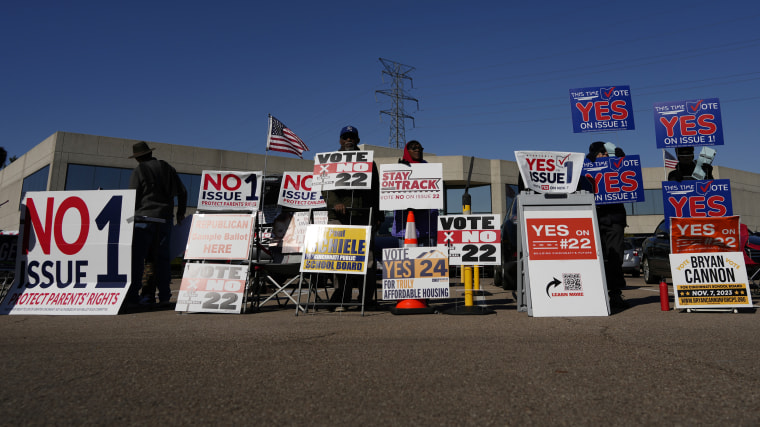In the 18 months since the Supreme Court overturned Roe v. Wade, abortion rights advocates have won every race in which the issue has appeared directly on the ballot.
But in several states, conservatives are refusing to let the results of those ballot measures be the last word.
In Ohio, Kansas and Michigan, for example, where abortion rights advocates won major victories in ballot measures over the past two years, anti-abortion groups and lawmakers are now turning their focus to blocking implementation of the initiatives by proposing bills and threatening lawsuits that would restrict the reproductive rights those elections protected.
The issue has emerged as a clear winner for Democrats heading into 2024. Abortion rights advocates are already working across at least 10 states to put the issue on the ballot next November, a move that could boost Democrats' fortunes in the presidential race and congressional contests. The winning streak has prompted some soul-searching within the national GOP, with party leaders and strategists urging candidates for federal office to soften their anti-abortion positions.
Still, some conservatives are forging ahead with hard-line positions and tactics in states where abortion rights proponents had some of their biggest successes recently.
“Neither side is going to give up — at least in the short term,” said Jonathan Entin, a constitutional law expert and professor emeritus at the Case Western Reserve School of Law in Cleveland, who has closely followed the legal and political battles over abortion rights in Ohio.
In November, Ohio became the latest red-leaning state where voters — in a resounding 14-point win for the Issue 1 ballot measure — enshrined abortion rights in the state constitution.
Just days later, conservative lawmakers drafted legislation that proposed giving the Ohio General Assembly “the exclusive authority over implementing Issue 1” — a move that would have “denied” that “jurisdiction” to all courts in the state.
The draft legislation, which has yet to be formally introduced, also proposed to “immediately dismiss” all lawsuits related to implementation of Issue 1 and threatened judges who refused to do so with a “misdemeanor” — a violation that could lead to impeachment.
Days after Issue 1 was formally adopted into the Ohio Constitution on Dec. 7, the state Supreme Court sent a case challenging a proposed six-week abortion ban in the state (a law Issue 1 effectively undid) back down to a lower court.
As a result, Ohio political observers predict that abortion opponents are likely to begin discussing future referendums that would roll back some of the specific protections to reproductive health care offered by Issue 1. Ohio Senate President Matt Huffman, a Republican, last month promised a “revolving door of ballot campaigns to repeal or replace Issue 1.”
“I would be surprised if Ohio did not have some kind of effort in the next two years to roll back what we just approved,” said Entin, the law professor. He added that it’s “very likely," even following the decisive Issue 1 victory, that the issue gets volleyed around from one proposed ballot measure to another.
In Kansas — a red state where voters overwhelmingly struck down a proposed constitutional amendment in August 2022 that would have removed language enshrining reproductive rights in the state — conservative lawmakers introduced 20 bills in this year’s legislative session that proposed restrictions on abortion to varying degrees.
Ultimately, Kansas lawmakers overrode Democratic Gov. Laura Kelly’s vetoes on several anti-abortion bills, including one that mandated additional criminal penalties for abortion providers in the state and another that required abortion providers to notify patients that medication abortion is reversible — a claim doctors say isn’t supported by science.
“It was a tough session,” said Anamarie Rebori-Simmons, of Planned Parenthood Great Plains, the group’s political arm in Kansas and other neighboring states. “Kansans spoke loud and clear on the issue” in 2022, she said, “and it’s tough that lawmakers continued to go after reproductive health care after a decisive vote.”
And in Michigan, a successful 2022 ballot measure to enshrine abortion protections in the state constitution led to Democratic Gov. Gretchen Whitmer repealing a 92-year-old abortion ban this year and signing additional abortion protections into law. That's led to abortion opponents suing to try to block further implementation of the ballot measure.
“Why wouldn’t conservatives be engaged to stop these anti-women bills?” said Kelsey Pritchard, the director of state public affairs for Susan B. Anthony Pro-Life America, an anti-abortion group that has been active in supporting conservative efforts to combat reproductive rights in Michigan and Ohio.
Anti-abortion groups are also fighting efforts by abortion rights groups to collect enough petition signatures to place the issue on ballots in states across the U.S., including robust “decline to sign” movements in South Dakota, Arizona and Nevada.
But abortion rights supporters say they are also prepared to keep fighting — even in states where voters have already weighed in.
In Ohio, for example, the next tactic by abortion rights advocates appears to be an ongoing effort to get a measure placed on the 2024 ballot proposing an independent "citizen-led redistricting commission” — a move some advocates said could help to better reflect, within the Ohio Legislature, the high levels of public support for abortion rights among voters.
“We knew that going into Issue 1, that a win was vital,” said Lauren Blauvelt, the executive director of Planned Parenthood’s political arm in Ohio and a proponent of that plan.
“But also," she added, "that we would have to continue to fight after a victory.”

